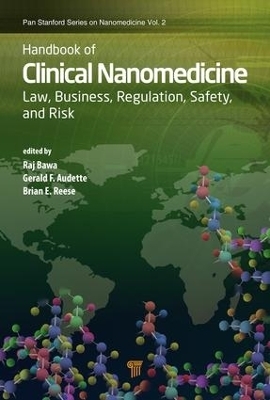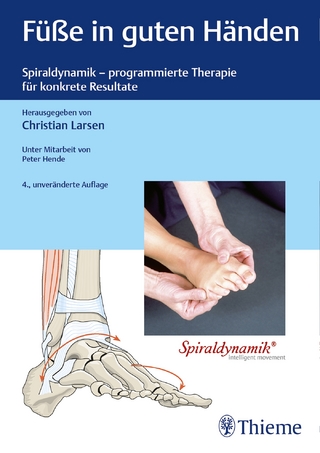
Handbook of Clinical Nanomedicine
Pan Stanford Publishing Pte Ltd (Verlag)
978-981-4669-22-1 (ISBN)
Raj Bawa, MS, PhD, is president of Bawa Biotech LLC, a biotech/pharma consultancy and patent law firm based in Ashburn, Virginia that he founded in 2002. He is an inventor, entrepreneur, professor and registered patent agent licensed to practice before the US Patent & Trademark Office. Trained as a biochemist and microbiologist, he has been an active researcher for over two decades. He has extensive expertise in the pharmaceutical sciences, biotechnology, nanomedicine, drug delivery, biodefense, FDA regulatory issues, and patent law. Since 1999, he has held various adjunct faculty positions at Rensselaer Polytechnic Institute in Troy, NY, where he is currently an adjunct professor of biological sciences and where he received his doctoral degree in three years (biophysics/biochemistry). Since 2004, he has been an adjunct professor of natural and applied sciences at NVCC in Annandale, VA. He is a scientific advisor to Teva Pharmaceutical Industries, Ltd., Israel. He has served as a principal investigator of National Cancer Institute SBIRs and reviewer for both the National Institutes of Health and the National Science Foundation. In the 1990s, Dr. Bawa held various positions at the US Patent & Trademark Office, including primary examiner for 6 years. He is a life member of Sigma Xi, co-chair of the Nanotech Committee of the American Bar Association and serves on the Global Advisory Council of the World Future Society. He has authored over 100 publications, co-edited four texts and serves on the editorial boards of numerous peer-reviewed journals, including serving as a special associate editor of Nanomedicine (Elsevier) and an editor-in-chief of the Journal of Interdisciplinary Nanomedicine (Wiley). Some of Dr. Bawa’s awards include the Innovations Prize from the Institution of Mechanical Engineers, London, UK (2008), the Key Award from Rensselaer’s Office of Alumni Relations (2005) and the Lifetime Achievement Award from the American Society for Nanomedicine (2014). Gerald F. Audette, PhD, has been a faculty member at York University in Toronto, Canada, since 2006. Currently, he is an associate professor in the Department of Chemistry and acting director of the Centre for Research on Biomolecular Interactions at York University. He received his doctorate in 2002 from the Department of Biochemistry at the University of Saskatchewan in Saskatoon, Canada. Working with Drs. Louis T. J. Delbaere and J. Wilson Quail (1995–2001), Dr. Audette’s research focused on the elucidation of the protein– carbohydrate interactions that occur during blood-group recognition (in particular during the recognition of O blood type) using high-resolution X-ray crystallography. Dr. Audette conducted his postdoctoral research at the University of Alberta (2001–2006) in Edmonton, Canada. Working with Drs. Bart Hazes and Laura Frost; his research again utilized high-resolution protein crystallography to examine the correlation between protein structure and biological activity of type IV pilins that are assembled into pili used by bacteria for multiple purposes, including cellular adhesion during infection. It was during these studies that Dr. Audette identified the generation of protein nanotubes from engineered pilin monomers. Dr. Audette also studied the process of bacterial conjugation (or lateral gene transfer) using the F-plasmid conjugative system of Escherichia coli. Current research directions include: structure/function studies of proteins involved in bacterial conjugation systems, the structural and functional characterization of several type IV pilins (the monomeric subunit of the pilus), their assembly systems, and adapting these unique protein systems for applications in bionanotechnology. Dr. Audette has previously served as co-editor- in-chief of the Journal of Bionanoscience (2007–2010), and is currently a subject editor of structural chemistry and crystallography for the journal FACETS. Brian E. Reese, PhD, JD, MBA, is an associate at the law firm of Choate, Hall, and Stewart in Boston, Massachusetts since 2012. Dr. Reese has extensive experience in intellectual property law, particularly patenting and trademark issues in the life sciences, and brings a practical knowledge of business strategy to his practice. As a former stock analyst, Dr. Reese has a strong appreciation for the business realities his clients face and how intellectual property can help them achieve their objectives. Dr. Reese graduated with a BS in cellular biochemistry from the State University of New York at Plattsburgh, where he received the Chancellor’s Award for academic excellence. He subsequently obtained his PhD from Pennsylvania State University for his research in the areas of neuroscience, molecular biology and toxicology. He also completed his MBA at Pennsylvania State University. Dr. Reese attended Albany Law School in Albany, NY, where he graduated magna cum laude. As a trained neuroscientist, Dr. Reese has authored several scientific and legal research papers in peer- reviewed journals. Each year, he moderates the American Bar Association’s panel on science and technology law at the Current Issues in Medicine and Pharma conference held at Rensselaer Polytechnic Institute in Troy, NY. Dr. Reese is active in providing pro bono services in intellectual property for several entities in the Boston area and currently serves as co-chair of the Nanotech Committee of the American Bar Association.
Section I – Law, Business and Commercialization. Section II – Regulatory Issues and Nanogovernance. Section III – Health, Safety, Risk and Biological Interactions. Section IV – Future Implications, Ethics and Perspectives.
| Erscheint lt. Verlag | 10.6.2016 |
|---|---|
| Reihe/Serie | Jenny Stanford Series on Nanomedicine |
| Zusatzinfo | 85 Illustrations, color; 36 Illustrations, black and white |
| Verlagsort | Singapore |
| Sprache | englisch |
| Maße | 152 x 229 mm |
| Gewicht | 1882 g |
| Themenwelt | Medizin / Pharmazie ► Physiotherapie / Ergotherapie ► Orthopädie |
| Medizin / Pharmazie ► Studium ► 1. Studienabschnitt (Vorklinik) | |
| Naturwissenschaften ► Biologie | |
| Technik ► Maschinenbau | |
| Technik ► Medizintechnik | |
| Technik ► Umwelttechnik / Biotechnologie | |
| ISBN-10 | 981-4669-22-9 / 9814669229 |
| ISBN-13 | 978-981-4669-22-1 / 9789814669221 |
| Zustand | Neuware |
| Haben Sie eine Frage zum Produkt? |
aus dem Bereich


